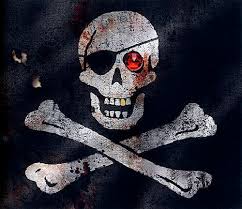Printed in Shoreline Times on Friday, December 19, 2008.
Dateline Europe by Jerome Wilson
 The 27 member-nation European Union has launched a battle fleet to combat piracy off the coast of Somalia. It will be the first naval operation in the multi-national organization’s history. Called Operation: Atalanta, after one of the strongest females in Greek mythology, the EU naval fleet will be commanded by Rear Admiral Phillip Jones of the British Royal Navy, assisted by Commodore Antonios Papaioannou of the Greek navy.
The 27 member-nation European Union has launched a battle fleet to combat piracy off the coast of Somalia. It will be the first naval operation in the multi-national organization’s history. Called Operation: Atalanta, after one of the strongest females in Greek mythology, the EU naval fleet will be commanded by Rear Admiral Phillip Jones of the British Royal Navy, assisted by Commodore Antonios Papaioannou of the Greek navy.
The command ship of the operation is HMS Northumberland, a Duke Class, British frigate, and Operation: Atalanta, when fully operational, will have three frigates, three other combat vessels, a supply ship and three surveillance aircraft. In addition to Britain; France, Germany, Greece, the Netherlands and Spain will participate and other European countries may join as well.
As part of its mission, the EU fleet will post armed units on board vessels that are delivering food under the UN’s World Food Program. Also, the fleet will seek to protect ordinary merchant vessels cruising in the pirate waters off the coast of Somalia and beyond. When necessary, the EU vessels will use force to stop piracy attacks. In addition, ships of the U.S. Navy’s fifth fleet are on piracy patrol in the area, as are ships from India and Russia. Somali piracy is an enormous problem. Thirteen pirated ships are presently anchored off the Somali coast, awaiting ransom negotiations with 250 to 300 captured crewmen being held. To date, $30 million in ransom has been paid to the pirates by ship owners to free their vessels.
The seriousness of the situation was demonstrated last September when pirates seized a huge Ukrainian ship, the Faina. The captured ship was carrying a warehouse-sized load of 33 Soviet-made, heavy tanks, as well as tank shells, grenade launchers and various other arms. A crew of 17 Ukrainians, three Russians and a Lithuanian were also captured. Initially, the pirates wanted $20 million to free the Faina. Now, ransom negotiations are down to $3 million.
The pirates, like those that seized the Faina, are usually dispatched from a mother ship, which houses them between attacks. When the pirates attack, they generally use open speedboats with powerful outboards equipped with automatic rifles, rocket propelled grenades, loudspeakers and sirens. Many pirates are former fishermen, who know the local waters and some of them were trained by the now disbanded Somali navy.
Another vessel in the grim “hit parade’ of successfully pirated ships was the huge supertanker, the Sirius Star. This Saudi Arabian-owned vessel, which is as long as the U.S. aircraft carrier Admiral Nimitz, was carrying two million barrels of crude oil, worth $100 million, when seized.
Significantly, the capture of the Sirius Star demonstrated that Somali pirates are no longer limited to capturing ships in the Gulf of Aden off the Somali coast. The Saudi supertanker was seized hundreds of miles south of the Gulf. In an interesting wrinkle, an Islamic religious group on shore suggested to the pirates that they let the Sirius Star go free without a ransom payment because the ship’s owners are Muslim. The pirates, who are also Muslim, rejected the suggestion.
Then, there is the story of the very big cruise ship that got away. In early December, two small pirate skiffs in the Gulf of Aden attacked the Miami-based cruise ship, the Oceania Nautica. This mega ship had a crew of 386 and 690 passengers and was in the midst of a 30-day voyage from Rome to Singapore when the pirates attacked from their speedboats. Quickly, the cruise ship captain ordered all the passengers into their staterooms and, after taking evasive action, the cruise ship simply outran the pirates. The pirates fired a few rifle shots but they fell far behind the fleeing cruise ship.
Another happy ending took place in December off the coast of Tanzania, well down the east coast of Africa. Although it is certainly alarming that Somali pirates are now operating this far from their own Somali coastline, the pirate fire of rocket-propelled grenades and automatic weapons from two speedboats were ineffective against a Dutch container ship. Like the Oceania Nautica, the Dutch ship simply increased its speed and got away.
Hopefully, these two “near misses” are part of a trend. However, some cruise passengers are not taking any chances. On a round-the-world cruise, the passengers on board the German cruise ship, Columbus, were fearful of sailing into the pirate-infested waters of the Gulf of Aden. Therefore, they disembarked from the cruise ship in Yemen, well before the ship entered the dangerous Gulf. The cruise ship passengers then took chartered airplane flights to the safety of Dubai where they stayed for three days in a five-star hotel. The crew for its part, brought the “passenger less” ship through the Gulf of Aden without incident. Once united in Yemen, the passengers and crew continued on their round-the-world cruise.
If the European Union’s Operation: Atalanta is a success, hopefully cruise ship passengers in the future will be able to stay on board even through what are now dangerous waters.